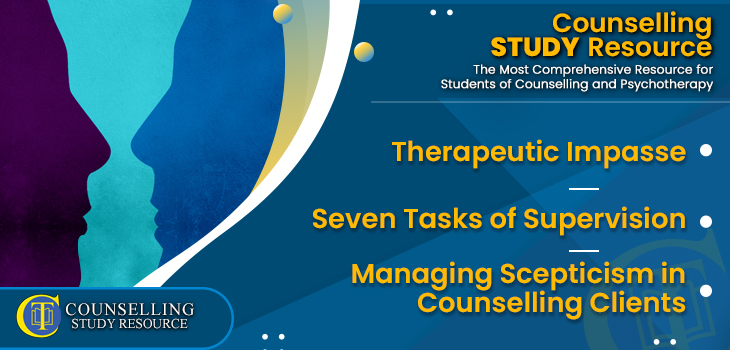195 – Therapeutic Impasse
Seven Tasks of Supervision – Managing Scepticism in Counselling Clients
Episode 195 of the Counselling Tutor Podcast opens with presenters Rory Lees-Oakes and Ken Kelly discussing therapeutic impasse in ‘Student Check-In’. Then, in ‘Focus on Supervision’, they explore Michael Carroll’s seven tasks of supervision. Last, Rory talks with counsellor Sally-Anne Armitage about working with sceptical clients.
Therapeutic Impasse (starts at 1.10 mins)
Rory summarises in plain English what therapeutic impasse is: ‘stuckness’.
He and Ken then go on to discuss some of the possible reasons for this, including:
- thin material
- transference or countertransference
- diversity that is not fully understood by the counsellor
When the feeling of stuckness emerges, it is important not to assume that this relates solely to the client: do look at yourself, too, and reflect, for example, on whether any countertransference may be taking place.
Even if you have not yet experienced a therapeutic impasse, you likely will at some point in your practice. When it does happen, Rory and Ken advise the use of congruence in verbalising the ‘stuckness’, and supervision to delve into its causes and how to work with it.
You can download a handout on therapeutic impasse here.
Seven Tasks of Supervision (starts at 12.35 mins)
Supervision is a topic that crops up frequently in the Counselling Tutor Facebook group. If you aren’t already a member, do come along and join over 37,000 students, qualified practitioners, tutors and supervisors interested in the world of counselling and psychotherapy.
The model of the seven tasks of supervision was developed by Michael Carroll, following research for his doctorate at the Department of Psychology at the University of Surrey in 1994. He gathered a wide range of material from both supervisors and practitioners.
Rory and Ken discuss the seven tasks of supervision:
- creating the learning relationship
- the teaching task
- the counselling task
- monitoring professional/ethical issues
- the evaluating task
- the consultative task
- the administrative task
They talk through each of these tasks in some detail, explaining their meaning and relating them to their own practical experience as supervisors and practitioners.
You may like to link the material here to the concept of the supervision triangle, presented in Podcast 192.
Counselling Tutor has recently developed an Advanced Certificate in Counselling Supervision. This allows practitioners with a minimum of one year’s post-qualification experience to gain the competence and training to offer both face-to-face and online counselling supervision, in line with evidence-based practice.
The course is mapped to the supervision competences set by the Association for Counselling & Therapy Online (ACTO), British Association for Counselling and Psychotherapy (BACP) and National Counselling Society (NCS).
Managing Scepticism in Counselling Clients (starts at 26.50 mins)
Rory talks with person-centred counsellor, lecturer and supervisor Sally-Anne Armitage, who works with the police force. Sally-Anne explains how this occupational group – who are accustomed to having to contain their feelings, and to having very difficult experiences – may find it difficult to see the value of speaking about their emotions. This led her to develop a particular interest in working with scepticism in the counselling room.
Rory and Sally-Anne discuss a range of topics relating to clients’ scepticism, including:
- the importance of reflecting on how scepticism impacts your own feelings as a counsellor
- applying Karpman’s drama triangle
- prevalence of scepticism in different groups
- the role of preconceived ideas on counselling
- how to deal with scepticism
- importance of confidentiality in tackling scepticism
- how to avoid getting pulled into modes other than counselling
- what works for Sally-Anne, and how to find a way that suits your own therapeutic style
- use of immediacy
- using metaphor when counselling sceptical clients
- the importance of being human, warm and welcoming, meeting the client where they’re at
- what sceptical clients have reported as bad experiences of counselling
- role of supervision, especially in exploring own process in response to clients’ scepticism.
Sally-Anne has recorded a lecture on this topic--you can watch it here.


